Debi emerges
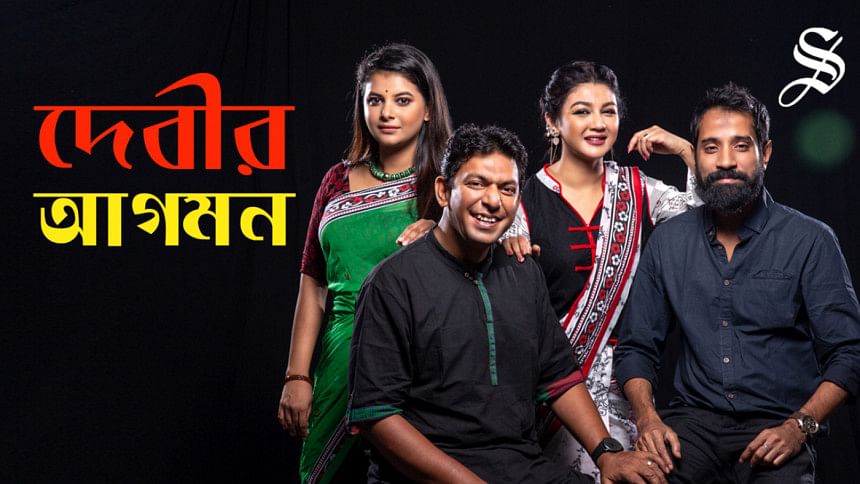
Anam Biswas and Jaya Ahsan have recently made a film adaptation of Humayun Ahmed's popular novel Debi. The movie of the same name is set to hit the theatres later this month. In a lively adda with Rafi Hossain, the Debi stars talk about the making of the movie and discuss the philosophies of the eminent novelist.
Rafi: Today I am very excited, as I have the whole team of Debi with me! I cannot wait to hear all the stories behind this grand project. So let's start with Jaya, shall I?
Jaya: (Laughter) Why me?
Rafi: Because you are the producer of the film! I know you are quite busy with the promotions of the film.
Jaya: I am a bit tensed, but I am really enjoying the whole thing. This was my first attempt, so everything seemed challenging. But I absolutely loved dealing with this challenge.
Rafi: Animesh, you are not in the director's chair this time! Let me ask Jaya, how has Animesh been as an actor?
Jaya: Animesh is a professional and he has been a constant support during the shoot. He has been a director's actor. When you have such a tested and experienced director, he is bound to be professional in whatever he does. The whole thing comes from mutual understanding.
Chanchal: We don't have too many director's actor in the industry right now.
Jaya: That, and such a handsome director's actor, too! (Laughter)
Chanchal: Animesh has been very cooperative throughout the whole time, so we would often bother him with this and that, but he would never complain.
Jaya: Animesh and I go a long way back. Those were rather different times. I was told that I have an 'urban look', that the modernity in my appearance cannot be erased by makeup so I am not suitable for simple, non-glamorous roles. Animesh was the first director to overcome this preconceived idea by giving me the role of a village girl in his telefilm Hatkura. I still remember having to pick the dirt off of used kitchen utensils to apply on my face and body, as our makeup was finished. So working with Animesh has been a very different experience for me. Even if we hadn't done Debi together, I would name Animesh as my most favorite co-artist, if anybody asked.
Chanchal: So Animesh is turning out to be a threat for us regular actors, I see! (Laughter) Seriously, after Debi I haven't signed another movie yet. But Animesh has already done that!
Animesh: All I can say is that I have been extremely lucky to get this acting opportunity. The offer came to me just three days prior to the shooting. Jaya suddenly called me and said, "You just have to do this!" I didn't even read the script thoroughly, though I always instruct my actors to read their scripts multiple times before shooting. About the film, I would say that 'Misir Ali' is a very unique character who has a distinct personality. It would never be easy to adapt one such character. Yet Chanchal pulled the job exceptionally well, his performance and dedication throughout the production have been outstanding. Naturally he is a very good actor, and our team also placed him perfectly with the set-plan and everything. For example, the house we selected as Misir Ali's residence seemed very close to the Misir Ali we find in the novels. Humayun Ahmed himself did not confine his creation Misir Ali within a certain set of personality traits. Misir Ali appears to the readers in diverse ways in different novels. Abul Hayat was the first person who said to Humayun Ahmed that Misir Ali seemed more like Satyajit's Professor Shanku. The author worked on his creation over and over again until his last days, so we should never show the audacity to brand Misir Ali as a static, constant being.
Rafi: Animesh, would you pick Jaya Ahsan for the character 'Ranu' if you made the film?
Animesh: Well, every director has their own different interpretation of a particular story. Since I have been working with Jaya for quite a long time, I know that I can put my faith on her for almost any kind of role. Here we have to keep in mind that the original plot of Debi is based in 1977, and our interpretation of the story has been based in 2018. So a lot gets changed and modified because of the way of interpretation.
Chanchal: I am interested to know whether Animesh himself would play the role of Misir Ali, if he had made the film!
Animesh: No, definitely not! (Laughter)
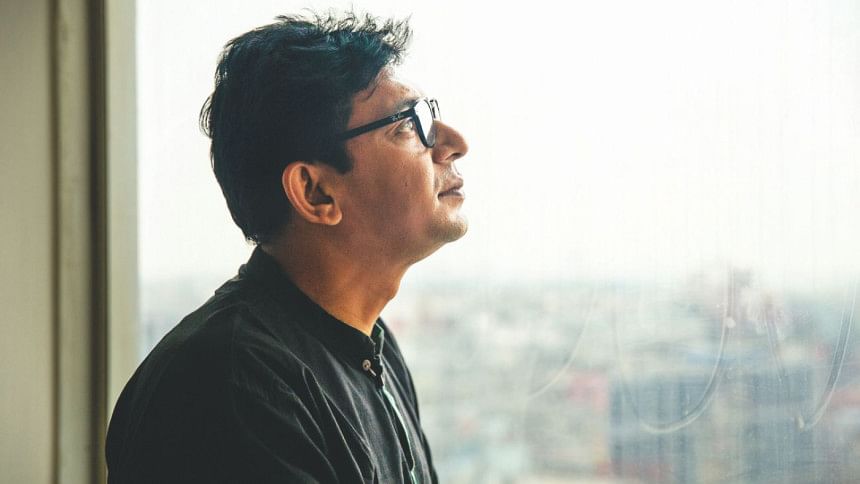
Rafi: So you would also give it to Chanchal?
Animesh: Maybe. Actors like Chanchal and Jaya are the kind who knows how to take control, how to own the characters they are playing. This is a very strong quality for any artist. So had it been me or any other director, the names of Jaya and Chanchal would undoubtedly be among the first few on the shortlist.
Rafi: Chanchal, how did you feel about the offer? Did you already see Animesh's previous works with Misir Ali stories?
Chanchal: I may have caught those once or twice on TV, but I intentionally did not want to see those works once I got the offer. Because I felt that seeing those works might affect my own adaptability, might confine my acting within a stereotype.
Jaya: Our collective goal was to make Misir Ali seem unique and one of a kind. I also try to avoid watching similar characters so that nothing affects my originality. I followed the same principle when I did the role of Charulata in my first Kolkata film Aborto.
Chanchal: I would like to put Devdas here as an example. It has been adapted into movies in both Dhallywood and Bollywood, in two different unique ways of interpretation.
Rafi: And I think that is just how it should be done to avoid repetitiveness. Let me come to Faria now. What was your experience? Did you read the novel beforehand?
Faria: Yes, I had already read the novel Debi before the offer came to me. I was not entirely prepared for big-screen filming, since it is completely different from what I am used to. In TV dramas we can overlook the small issues. But in the movies, you have to be one hundred percent prepared to deal with every single detail. Everything has to be perfect. So I thought I still needed more time and experience before accepting film offers. But once I was told that it was based on a novel by Humayun Ahmed, I could not resist the temptation. I was aware that Jaya apu was about to make a film with government support. But little clue did I have that it was going to be this very film. Once I received the offer, I requested for some time before I said yes or no. And I bought the book again, read it thoroughly, and assured myself that it is doable for me.
Rafi: And then you met Jaya and confirmed?
Faria: Actually I met Jaya Apu much later after accepting the offer. I was reached by the casting director, and after that I had multiple sessions with Anam Biswas about the film and its requirements. But the whole time I did not meet Jaya Apu.
Rafi: Jaya, was it your decision or a total team decision that you took Faria for the role?
Jaya: It was a team decision. We did consider a number of actors, but in the end Faria seemed to suit our requirements perfectly. I requested Anam to give her time and see if she would be compatible with everything.
Faria: I still remember, on our second meeting Anam Da told me that I will not be allowed to take any kind of makeup. It was very intimidating for me, as I never appeared without makeup on TV shootings. But Anam Da assured me that there is nothing to be worried about.
Jaya: Well we have to follow the script's requirements. Each role has its own demands. And the credit goes to the artists only when they do justice to the script by delivering precisely as per the requirements. Faria looked quite pretty without makeup. Even my role did not need that much of makeup.
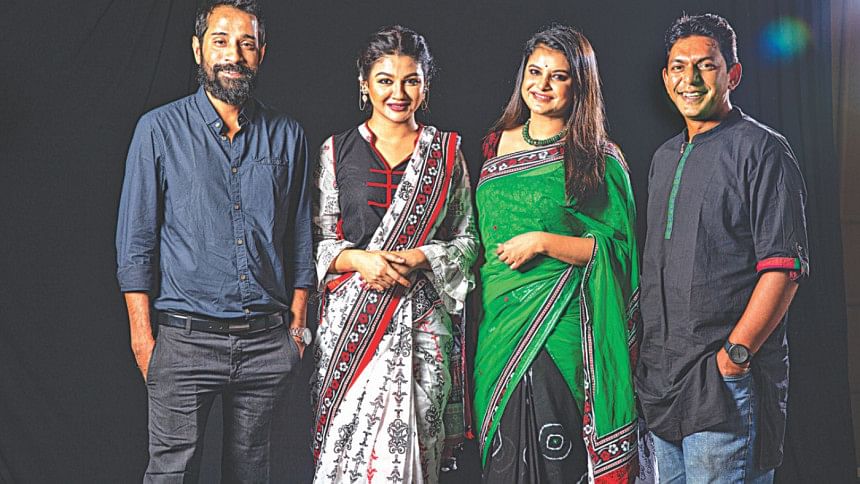
Rafi: Animesh, was it your first time working with Anam?
Animesh: No, Anam acted in my TV dramas before. It was almost 12-14 years ago!
Jaya: I also worked with Anam as a co-artist before! We worked in 69 which was Anam's first TV fiction. We worked together in another drama where he played the role of a saint.
Animesh: Anam and I go way back. He would often come to Charukola to join our adda and sing. Our get-togethers continued for years.
Rafi: Can we say that Jaya Ahsan has been successful as a producer?
Jaya: (Laughter) I shouldn't make any such claim. I will let the audience be the judge!
Rafi: Of course, there is no absolute parameter based on which we can judge a movie's success.
Jaya: Definitely. Many well-directed films with amazing scripts failed to bag commercial success. Even the audiences sometimes fail to grasp the depth and dedication behind the films.
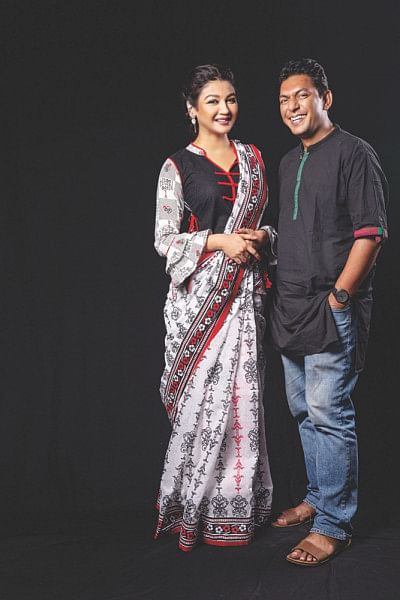
Rafi: Debi has already attracted a huge number of audiences with its teasers and promotional campaigns. And there is the loyal fan base of Jaya and Chanchal who are always anticipating something special from them!
Animesh: Yes, we have 'Chanchal – the hotcake' of current times! (Laughter)
Jaya: (Laughter) Jokes apart, he is a really talented artist. And extremely lucky too, delivering one hit after another!
Chanchal: (Laughter) What can I say? I have been lucky, that's very true.
Animesh: Luck is one thing, but nobody can deny your phenomenal acting prowess. And what my years of experience tell me is that,star artistes play irreplaceable roles in making a film successful. Many may claim that it is not necessary to have stars to take your film closer to the audience, but I think when you have the opportunity you should always utilize it.
Rafi: Yes, I agree. We often hear the term 'larger than life', and I think stars play a big role in making a film seem like that.
Animesh: The whole shooting and production has been executed to our utter satisfaction. We are very excited about how the audience would respond to the film. I just wonder how Humayun Ahmed, the great author himself would react to this depiction!
Jaya: If only we could have Humayun Sir sit down with us to watch our creation and give us his feedback!
Chanchal: I have been fortunate to work with the legend. My experience with him had been very pleasant; Humayun sir loved to chat and gossip about many things. At times it seemed to me that a whole Misir Ali lived inside him. So later, when I was preparing myself for the role, the characteristics of Humayun Ahmed started to influence me a lot. His way of walking and talking, and everything related to his persona encapsulated me for the time being.
Faria: Jaya Apu had told me that Humayun Ahmed somewhat felt that one person who truly understood Misir Ali was Animesh Aich. And so he had wished that Animesh Da would play the role of Misir Ali, someday.
Rafi: Let's hear about this from Animesh himself. What do you have to say about your work experiences with Humayun Ahmed?
Animesh: I have been blessed to have had the opportunity to work with him. It was quite early in my career, and I did not know much about the art of production. I was so naïve; I told him straight that there were some major flaws in the DOP of his film Shyamol Chhaya. I don't know if it was my naivety or my boldness, but Humayun Sir liked me instantly. I gave him a CD of my work Brihonnola, and after watching it he called me and praised me for 17 minutes straight! After that, we became very close. He once came to the premier show of Nishad in BIAM auditorium. He came so early that none of the other guests had arrived yet. So for him, I played Brihonnola in the hall again, and he watched it again.
Jaya: And luck has brought Animesh back again to the creation of Humayun Sir!
Animesh: I think my fate has somehow got tied!
Rafi: How was his reaction when he saw your depictions of Misir Ali? You did not give the same look to all three of the protagonists, as far as I can remember.
Animesh: Yes, all three of my previous Misir Alis had different looks, different styles. However, Humayun Sir only saw the first two works. Here's an interesting story – Humayun Sir had some serious superstitions! He believed that seeing a spider before any journey makes it ominous. The third Misir Ali drama, where Humayun Faridi played the protagonist, had a scene with a spider in the beginning. After seeing that, Humayun Sir just stood up and said he must not watch this anymore!

Rafi: That's very interesting!
Jaya: Throughout the whole time we were thinking about Humayun Sir.
Chanchal: I took some photos of myself after taking the getup of Misir Ali for the shooting and sent them to Shaon Apa for her feedback. She joyfully replied that she was amazed to see the look. She said that from her and Humayun Ahmed's conversations on Misir Ali, it would seem that Misir Ali would have a getup similar to the one I had!
Rafi: That's also a big achievement! So it seems very clear that everyone related to this film gave their honest and complete dedication to make it a success. And I am sure the audience will also honor this grand effort by going to the halls to watch the film.
Faria: The lack of proper sources of entertainment keeps our audiences mostly dissatisfied, so I am sure Debi will create a difference amidst all the scarcity.
Rafi: On that note, Faria, I'd like to know your opinions on the demands of the upcoming generation.
Faria: The generation definitely knows how to value a good piece of art. Recently, I came to know that sale of the novel Debi has radically increased ever since the teasers and posters of our film were released. So it is clear that people are genuinely interested.
Jaya: Not only in Bangladesh, I have received feedback from West Bengal that many people have been looking for a copy of the novel in the local bookshops there!
Faria: Humayun Ahmed was so much ahead of his time that despite Debi being written quite a long time ago; it still seems relatable and relevant to contemporary society and culture. All my friends and well-wishers have also been very positive and supportive. We demanded poster ideas from the fans, and the response has been outstanding so far.
Jaya: We never wanted to seem like we have reserved all the rights of Misir Ali. Misir Ali is universal, and unique for each and every single fan. We wanted to carry that spirit of openness, and so we organized the poster competition. Perhaps we will arrange an exhibition afterwards and declare the top three.
Faria: Many fashion houses and designers are releasing accessories like Debi tip, Debi ring and so on.
Animesh: We men might as well get a Debi tie soon!
(Laughter)
Jaya: We do have some accessories for men! We have teamed up with Bishwo Rang for official Debi accessories. There we have Debi themed Panjabi and dhuti with a hibiscus flower for men.
Faria: I think this is the first time any film in Bangladesh has gained such hype!
Rafi: We need the audience to come back to the halls, and so whatever is necessary for that must be done accordingly. Before we wrap up, let's hear from each one of you about your final thoughts on the movie.
Animesh: Making a film successful in our country is not easy. The audience groups are diverse, and it is a mammoth task to reach all of them. Jaya Ahsan has been superb so far, and has to continue this way for some more days until the movie finally hits the cinema halls. From PR to hall management, a lot of processes need to run effectively at the same time to make a film successful. We need luck in our favor, and of course, we need the audience on our side to support tasteful entertainment.
Chanchal: Our industry is still running with an amateur attitude. I think it's the responsibility of the artistes to change this attitude. All the artistes who support true art should come and promote movies like Debi, forgetting their personal benefits or ego issues.
Rafi: For the sake of the industry's prosperity!
Chanchal: Absolutely. Another thing that I think we need to be straightforward about is the financial aspects. We invest a huge amount of money on such projects. We take all the risks, for the sake of presenting our beloved audience with something extraordinary. And so it would be disappointing if we don't get the proper valuation of our efforts. Also it has been a film with financial support from the Government, and I personally cannot recall any other Government-supported film to attain this much of popularity even before the release. So I can sense the momentum in the industry changing, which is very positive.
Faria: I agree. Also the success of one film will encourage other directors to follow the same recipe. This way, our industry will eventually become more and more progressive with its attitude.
Jaya: It has been an amazing teamwork from the beginning. A lot of people, names mentioned and not, have given their best to take the film to the best possible level. I am indebted to every single crewmember and artist for the way they have cooperated with me and Anam. I am also indebted to the Government because without the financial aid nothing would have been possible. I would like to request everyone to go to the halls and see the movie on the big-screen. It has been made with people's money, and it solely is a 'people's film'. Please do not wait for the movie to pop up on some online portal, because piracy is a crime and everyone related to piracy is a criminal. I took a huge risk for my first production; perhaps I could have chosen a safer, traditional kind of script. But I was brave, believing in myself and my audience. And so I hope my audience will not disappoint me.
Rafi: Thanks to all of you. We are sure Humayun Sir is looking down at us from the sky and blessing the Debi team. All the best!



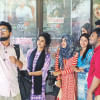


Comments